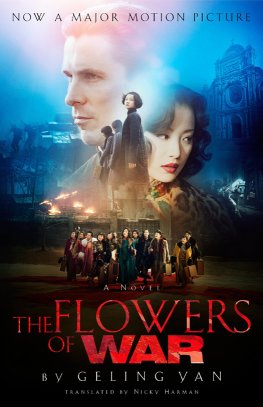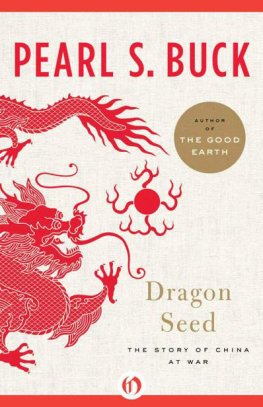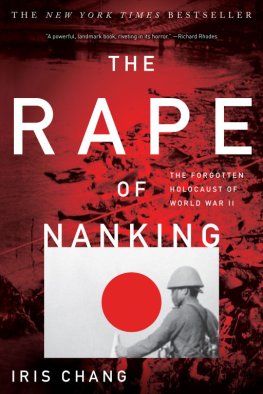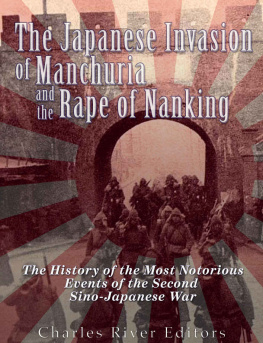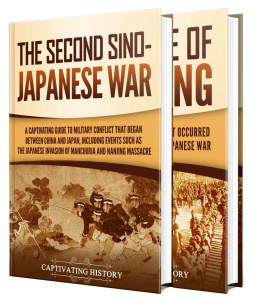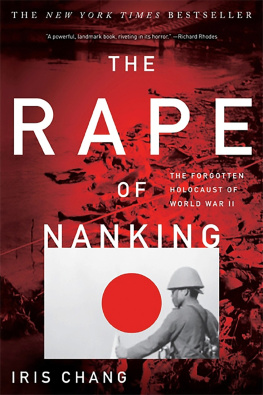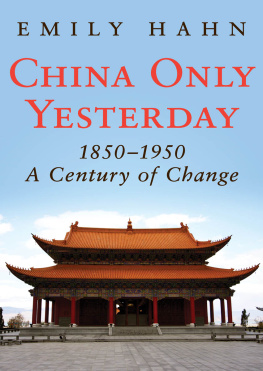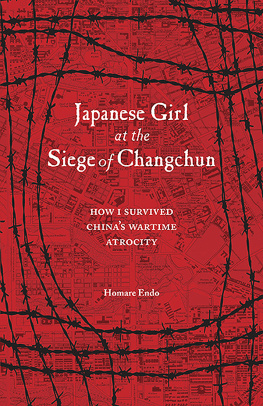Geling Yan
THE FLOWERS OF WAR
Translated from the Chinese by Nicky Harman
One


Shujuan woke with a start. The next thing she knew, she was standing beside her bed. It was about five in the morning, a little earlier perhaps. At first she thought it was the absence of gunfire that had woken her. The artillery that had been thundering for days had suddenly fallen silent. Then she noticed a warm stain on her cotton nightgown. She stood barefoot and dazed. Blood. The wetness quickly turned icy cold. So, it had finally happened to her, as it does to every woman.
Her makeshift bed was in a row of eight. There was a narrow gangway and then another eight beds. Buildings all over Nanking were burning and light from the flames filtered through the blackout curtains that covered the small oval attic windows. Orange patterns rippled across the room. Shujuan could make out the sleeping forms of the other girls and hear their deep breathing as they dreamed of more peaceful days.
She pulled a jacket over her shoulders and climbed down through the trapdoor in the floor to the workshop below. The workshop was used for printing and binding the pamphlets and hymn sheets that the St Mary Magdalene mission needed for church services and its other religious work. Usually the attic above was unoccupied. The trapdoor was merely to allow access for electrical or roof repairs. It was connected to a ladder by an ingenious mechanism that extended the ladder downwards as soon as the cover was opened.
When Shujuan and fifteen classmates had arrived at the mission compound the previous evening, Father Engelmann had told them to stay upstairs in the attic as much as possible. They had been given a tin bucket to urinate in. But the blood on her nightdress was an emergency. Shujuan needed to go to the washroom.
Father Engelmann hadnt expected that he would have to give the St Mary Magdalene schoolgirls shelter. Yesterday afternoon he, Deacon Adornato and their two servants, Ah Gu and George Chen, had taken those pupils who had been unable to leave school down to the river to get the ferry to Pukou. But they had been unable to board. When the steamer pulled into the dock, a group of badly wounded soldiers appeared and pushed the girls aside. One of the soldiers told Father Engelmann that their division had been shot at, not by the Japanese, but by their own side. They had received orders to make an emergency retreat but had clashed with Chinese soldiers who had not received the same order and so thought they were deserters. Having obeyed instructions to destroy their heavy weaponry on leaving the battlefield, they were a sitting target. They were machine-gunned and came under artillery fire, and some were then crushed by tanks. Losses and injuries on the retreating side ran into the hundreds before the misunderstanding was sorted out. No doubt out of a sense of guilt, the unit who had inflicted the injuries took over the boat at gunpoint, and put the wounded onboard. There was no room for the clergymen and the girls.
Father Engelmann had felt that it was too dangerous to stay by the river. He and Deacon Adornato had led their little party back through the alleyways of Nanking to the church, with Ah Gu and George Chen bringing up the rear.
Shujuan clambered down the wooden ladder that creaked at each step she made. On reaching the floor of the workshop, she felt the bone-chilling December damp seep through the soles of her slippers. Standing on one of the tables near the ladder was a thick candle melted into a shapeless mass of wax. Its quivering sprout of light gave Shujuan a little comfort as she felt her way across the workshop. Father Engelmann had promised the girls that, when daylight came, they would return to the dock and, if there was no ferry, they would make for the Safety Zone and take refuge there instead.
As Shujuan groped her way down the corridor made by the work tables, the candle went out like a sigh. She stopped, disoriented. The silence frightened her. Over the past days, she and her schoolmates had become accustomed to the thunder of artillery and machine guns. The lack of gunfire was disquieting. Not peaceful but ominous, as if Nanking were surrendering. But how could that be? Only a day ago Father Engelmann had reassured them that the city was impregnable. The sturdy city walls and the Yangtze River meant that it would be extremely difficult for the Japanese to take the city.
Almost all the pupils who had been left at the school were orphans. Only Shujuan and Xiaoyu had parents, but they were abroad and had waited until too late to come and fetch their daughters. Shujuan felt utterly betrayed. Clearly her cowardly parents had not wanted to come back to a capital city abandoned even by the Chinese government.
In the washroom, she stood by the toilet and examined her nightdress. She was torn between curiosity and disgust at the dark liquid issuing from deep within her belly. She had the sense that this blood had turned her flesh into fertile soil, a place where any demon could implant a seed which would put forth shoots and bear fruit. Shuddering, she wedged a bulky cloth into her underwear and left the washroom, walking in an ungainly fashion. In the workshop she went to the window and pulled aside the blackout curtains. The bell tower of the Gothic church loomed in the night. It had been shelled a few days before and, along with the main entrance to the compound, had been reduced to rubble. The only way into the compound now was by a smaller side door. Behind the church she could just make out the lawn. Father Engelmann was passionate about this patch of grass. It was, he said proudly to his congregation, the last island of green left in Nanking. For decades it had served as a place for holding charity sales and celebrating weddings and funerals. Now it was dominated by the two flagsthe Stars and Stripes and a Red Cross onethat lay on the grass as a signal to aircraft that it was neutral territory. In spring and summer, the lushness of the grass formed a fairy-tale setting for Father Engelmanns red-brick rectory.
Shujuan stared up at the ruined tower which, silhouetted against the fires that raged outside, still retained some of its grandeur. There was a glimmer of dawn in the east. It looked as if it would be a beautiful day. Climbing back up the ladder, she slipped quietly into bed and fell into a deep sleep.
* * *
Shujuan was woken not long afterwards by shrieks and wails coming from downstairs. Together with the other girls she jumped out of bed and ran over to the windows. Pushing aside the blackout curtains and tearing away the rice paper from the window frames, they managed to get a view of the front courtyard.
Shujuan pressed the side of her face up against the window frame. She saw Father Engelmann run out from behind the church, his ample cassock flapping like a sail. Youre not allowed over the wall! he was shouting. Weve got no food!
Some of the bolder pupils opened a window. Now they could take it in turns to stick their heads out and see better. Sitting on top of the wall, above the side door, were two young women. One was wearing a bright pink satin dressing gown which made her look like a newly wedded wife who had just jumped out of bed. The other wore a fox-fur stole over a tight cheongsam.
Fascinated by the drama, the girls climbed, one by one, down the ladder, walked through the workshop and went to huddle together in the doorway. By the time Shujuan arrived, there were another four women on top of the wall. Despite Father Engelmanns attempts to keep them out, the first two had succeeded in jumping down. By this time Ah Gu and George Chen had joined the fray.

